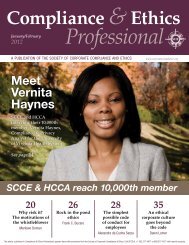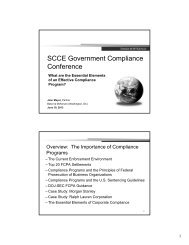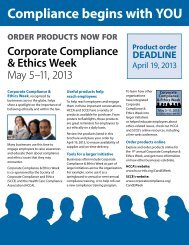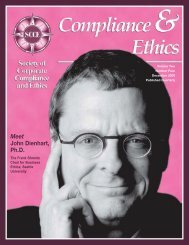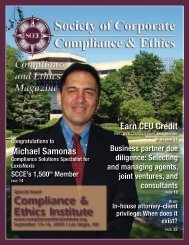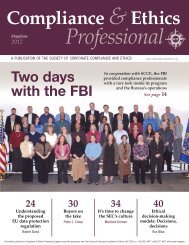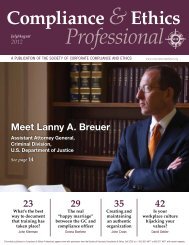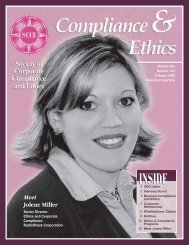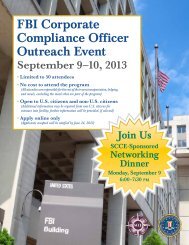Compliance & Ethics Professional - Society of Corporate ...
Compliance & Ethics Professional - Society of Corporate ...
Compliance & Ethics Professional - Society of Corporate ...
- No tags were found...
Create successful ePaper yourself
Turn your PDF publications into a flip-book with our unique Google optimized e-Paper software.
<strong>Compliance</strong> & <strong>Ethics</strong> <strong>Pr<strong>of</strong>essional</strong> March/April 2012··Communication. Companies need toexplain policies and procedures to staffand others.··Monitoring and review. Policies, procedures,assessments, and due diligenceshould be kept up to date and checked onperiodically.Red flagsAs companies implement their due diligenceprocesses, they’ll likely encounter one or more“red flags” that might divert their attention oreven impede their progress. Below are some <strong>of</strong>the common issues and suggested techniquesto address them.··Too much information on the Web.Consider adapting your search parameters,getting a team involved, or contracting theresearch to a firm with specialist researchcapabilities.··Too many people with the same name.Again, adapt the search strategy, get extraidentifiers, or use a pr<strong>of</strong>essional firm. Adatabase that allows for name variations isalso very useful.··No results. There are a few possibleoptions here: (1) The person has left a verylow public pr<strong>of</strong>ile and there are no negativeissues relating to him/her; (2) The individualhas altered or concealed his/heridentity; and (3) You have incorrect details.Ask the individual under examination toconfirm personal and business information.It could be a major red flag if searchresults don’t produce anything <strong>of</strong> value.··Similar name with a red flag. If the nameis common, this may or may not indicate aproblem. Consult with an expert to checkthe identifiers you have in place.··The subject is on a sanctions list, or hascommitted a crime, or there are allegations<strong>of</strong> a crime. A red flag might be abig issue or it might be an error—a false“It’s important to takeaway that, on furtherexamination, these redflags may turn out to befalse positives. Reportsmay relate to anotherperson, for example.”positive. Have the result reviewed andconsider further checks.··The subject has a long, complex history.A high-pr<strong>of</strong>ile individual or firm mayhave many red flags, some <strong>of</strong> which canbe explained by media errors or politics.If you want to proceed, you will almostcertainly have to use a higher level <strong>of</strong> duediligence and possibly make some difficultjudgment calls.··The subject has no significant problems,but has a history with colleagues/partners.Often, a subject will claim (or a publicrecord will indicate) that an individual orfirm was linked to someone who encounteredan issue, but held no blame. This willprobably require more in-depth investigationand assessment. Dealing with red flagsrequires discretion, diplomacy, legal compliance,and business sense.It’s important to take away that, on furtherexamination, these red flags may turnout to be false positives. Reports may relate toanother person, for example. In other cases,results will be correct, but the information canbe set aside for further investigation, if necessary.For example, if the subject was the client<strong>of</strong> a financial institution that had fraud problems,but there is no suggestion the subjectwas anything but a victim.Last, sometimes the evidence maybe strong enough to justify ending the56 www.corporatecompliance.org +1 952 933 4977 or 888 277 4977




